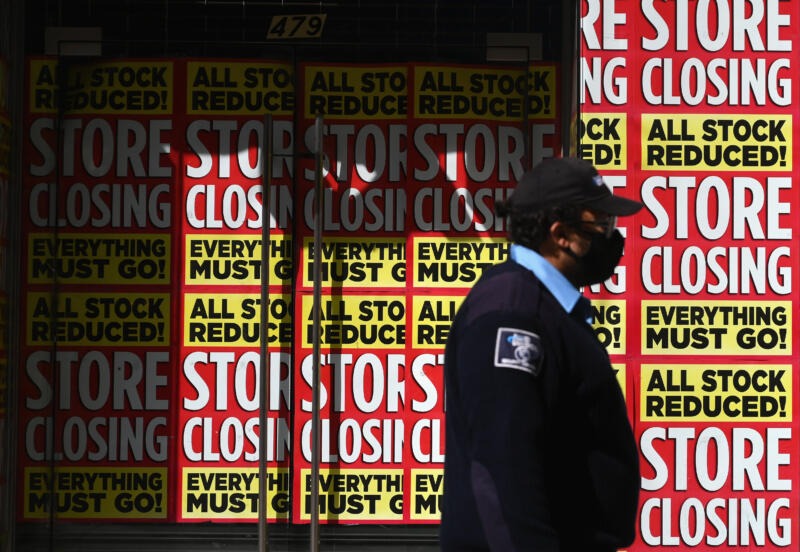Grim economic data reveals virus devastation
A man walks past a store going out of business in Brooklyn, New York — the news for the US economy is dire, with another 3.2 million Americans filing unemployment claims (Angela Weiss)
London (AFP) – A new raft of bleak economic data laid bare the crippling worldwide impact of the coronavirus pandemic on Thursday, as hard-hit Europe moved to further ease lockdown measures in a bid to get people back to work.
The United States said another 3.2 million people filed unemployment claims last week, while Germany and France reported major slumps in industrial production and Britain said its economic output would plummet by 14 percent this year.
Governments around the world are under immense pressure to ease the economic pain caused by measures to stop the virus, which has claimed more than 266,000 lives, infected 3.8 million and left half of humanity under some form of lockdown.
Many European nations are now cautiously easing restrictions in the hopes of stabilising their reeling economies, with some shops and schools re-opening, Italy allowing Catholics to attend masses from mid-May and Norway to open up pubs on June 1.
US President Donald Trump is also pushing for lockdown measures to be lifted, as he tries to steady the world’s largest economy before voters head to the polls in November.
“This country can’t stay closed and locked down for years,” he said Thursday at a meeting with Texas Governor Greg Abbott, whose state was one of the first to lift stay-at-home rules.
But experts have warned that social distancing will remain necessary until a vaccine is developed — and governments are keen to avoid a devastating second wave of infections.
The British government was on Thursday reviewing lockdown measures, with Prime Minister Boris Johnson expected to offer a roadmap on easing restrictions on Sunday.
Johnson — who himself was hospitalised for the virus — said Thursday: “We will proceed with maximum caution”.
– Trouble for tourism –
The easing has already begun in Germany, Europe’s largest economy, while France is due on Monday to start emerging from a lockdown that began in mid-March.
But French Prime Minister Edouard Philippe said four regions including the greater Paris area would see a more limited easing of restrictions as authorities remain concerned.
In the Ile-de-France region that includes the capital, “the number of cases is falling but remains high — higher than we would have hoped”, he said.
Many Europeans are anxious to get back to work, like Elena Isaac, a restaurant owner in Cyprus’s now-empty beach resort of Ayia Napa.
“You can’t survive with no tourists… It is impossible,” she told AFP, as nearby residents enjoyed the loosening of a six-week lockdown with swims in the Mediterranean.
Economists have been warning for weeks that the pandemic will lead to the worst global economic downturn since the Great Depression of the 1930s, and new data are revealing the extent of the damage.
Beyond the US jobless figures, Germany said its industrial production fell by 9.2 percent month-on-month in March, while in France it dropped 16.2 percent.
Airlines and travel are among the sectors worst hit by the pandemic, with flights grounded worldwide and social distancing measures severely limiting leisure and business trips.
The World Tourism Organization said Thursday that the number of international tourist arrivals will plunge by 60 to 80 percent in 2020 because of the pandemic.
Cruise lines, shut down because of the pandemic, are still struggling to repatriate tens of thousands of crew members stranded aboard ships at sea.
“We are desperate to get home. Desperate,” says Jessica Furlan, who works on the Celebrity Infinity, which is in limbo somewhere between Florida and the Bahamas.
– Moscow extends lockdown –
Most of Europe has seen a significant drop in the number of new infections and deaths from the virus, but cases are on the rise in Russia.
On Thursday, it reported another record increase with more than 11,000 new infections.
Moscow Mayor Sergei Sobyanin announced that lockdown measures would be extended in the capital until May 31.
The United States remains the hardest-hit country — with more than 1.2 million cases and over 75,000 deaths — but Trump has said it is crucial to re-open the shuttered economy.
The new jobless claims announced on Thursday brings the total to a staggering 33.5 million newly unemployed since mid-March.
“We will vanquish the virus, we will defeat the enemy. We will not fail,” Trump said Thursday at a prayer service at the White House.
Also on Thursday, the White House said a military aide — reportedly working as a valet for Trump — had tested positive for coronavirus, but the president had not been infected.
– Minorities at higher risk –
Scientists are working hard to produce a vaccine to combat the novel coronavirus — but also just to determine all of the symptoms it provokes.
“At the outset, we were told to watch out for headaches, fever and a light cough,” recalls Sylvie Monnoye, a family doctor in central Paris for nearly three decades.
“Then they added a runny nose and a scratchy throat. After that, digestive problems, including stomach aches and severe diarrhoea,” she added.
“We started to think that we should suspect everything,” said Monnoye, dressed from head-to-toe in protective wear.
In Britain, studies have shown that ethnic minorities are at much greater risk from the pandemic, with the Office for National Statistics saying black men and women were more than four times more likely to die with coronavirus than white people in England and Wales.
In Brazil, a similar pattern has emerged, with blacks dying at a higher rate, statistics show.
burs-sst/ec
Disclaimer: Validity of the above story is for 7 Days from original date of publishing. Source: AFP.


